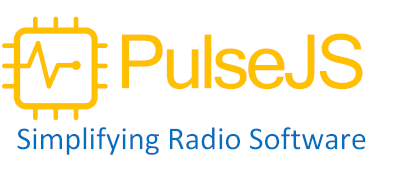PulseJS
PulseJS: Rapid Radio Application Development
PulseJS is a software engine that dramatically accelerates the development of Software Defined Radio applications. Designed specifically for non-experts in radio and signal processing, it transforms what traditionally took a week or more into a matter of hours.

Using a JavaScript-like programming language, PulseJS enables field operators, system integrators, and developers to create custom radio applications without requiring deep RF expertise. Whether you need to monitor communications, analyze signals, or deploy sensor networks in defense or civil applications, PulseJS provides the tools to build your solution quickly and efficiently.
From Complex to Simple
Traditional Software Defined Radio development requires extensive knowledge of signal processing, radio frequency theory, and low-level programming. This creates a significant barrier for organizations that need radio solutions but lack specialized RF engineers. PulseJS removes this barrier by providing a high-level, accessible programming environment that handles the complex signal processing operations behind the scenes.
The engine works as a JavaScript virtual machine that executes your application logic while automatically leveraging hardware acceleration through GPUs when available. This architecture delivers professional-grade performance without requiring you to manage the low-level details. You write your application logic in familiar JavaScript-style syntax, and PulseJS handles the signal processing complexity, offloading complex computation to GPU when possible.
Extensive Built-in Capabilities
PulseJS comes equipped with a comprehensive library of radio functions ready to use in your applications. Signal analysis tools include spectrum analyzers and autocorrelation functions that help you understand what's happening in the radio environment. The engine supports multiple demodulation schemes including AM, FM, SSB, FSK, GMSK, and DMR, allowing you to work with various communication standards without implementing decoders from scratch.
Beyond signal processing, PulseJS includes practical integration features that real-world applications require. The integrated web server enables remote monitoring and control of your application. Notification capabilities through SMTP, MQTT, and custom APIs ensure your system can alert operators or integrate with existing infrastructure. The engine can also interface with GPS receivers, process data from CAN buses and serial ports, and coordinate with other PulseJS instances in mesh network configurations.
Flexible and Extensible Platform
PulseJS runs on any Linux-compatible processor, from x86 servers to ARM embedded systems, and can leverage GPU acceleration when available. The engine natively supports popular SDR hardware including RTLSDR, LimeSDR, BladeRF, Airspy, SDRPlay, and Ettus USRP devices, along with any receiver compatible with the SoapySDR framework. This hardware flexibility means you can develop once and deploy across different platforms without rewriting your application. Custom platforms can be added on request.
When PulseJS's built-in functions don't cover your specific needs, the plugin system allows you to integrate existing code modules written in C or C++. This extensibility ensures that specialized algorithms, proprietary demodulation schemes, or custom encryption implementations can be incorporated seamlessly.
Your existing signal processing investments can be exposed to PulseJS and used alongside its native capabilities.
Documentation and Support
Comprehensive online documentation and tutorials guide you through PulseJS development at https://sdrvm.sdrtechnologies.fr/.
For teams requiring additional assistance, SDR-Technologies offers training sessions, technical support packages, and expert consultation services.
The Pulse Discovery Kit provides a complete hardware and software bundle that lets you start prototyping immediately, while the Pulse Advanced service connects you with signal processing experts who can help optimize your application.
Pricing & Availability
PulseJS ships immediately, starting at 1 800 euros excluding VAT. Contact us for training sessions.
Ready to accelerate your radio application development?
Contact us to learn how PulseJS can simplify your next project.